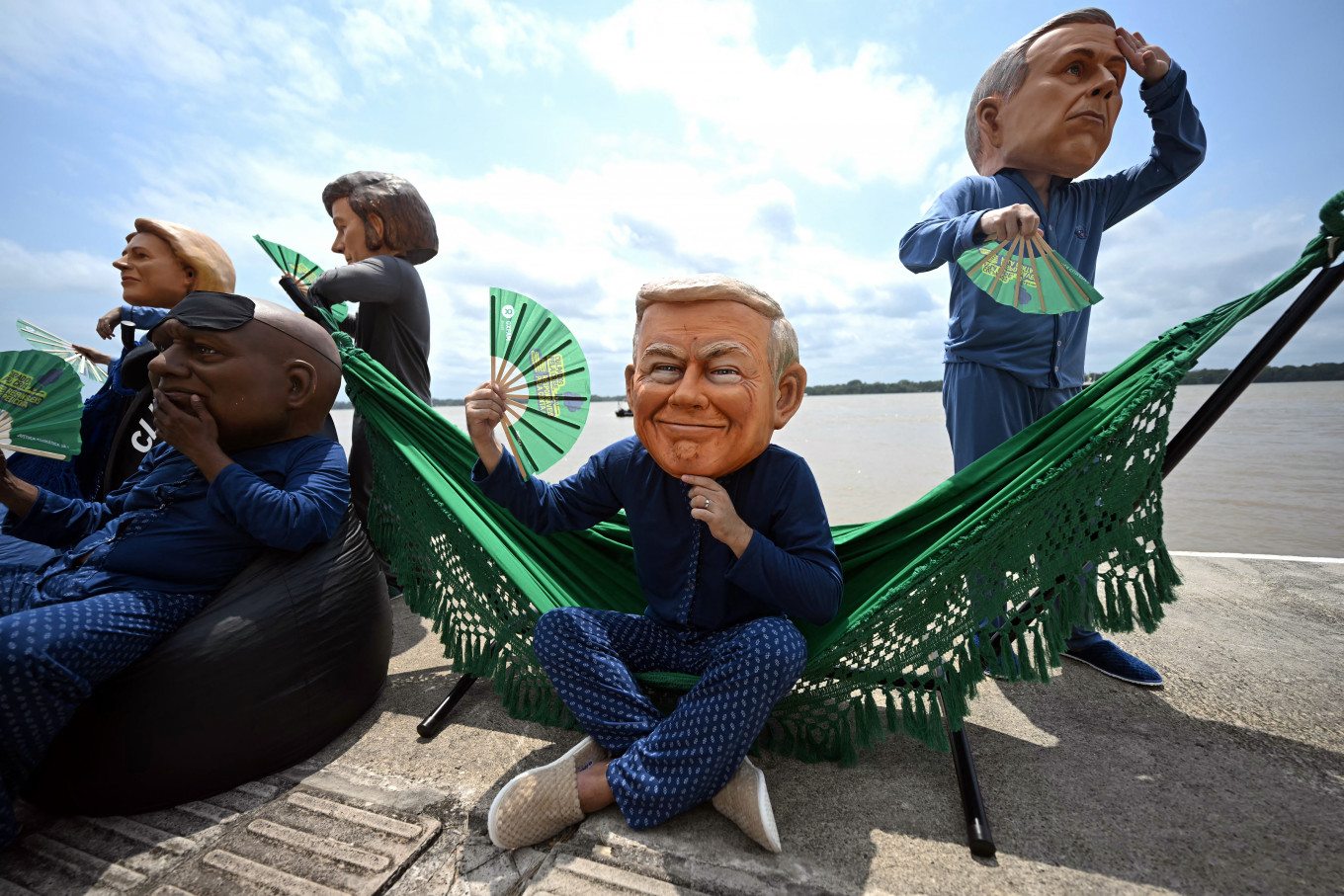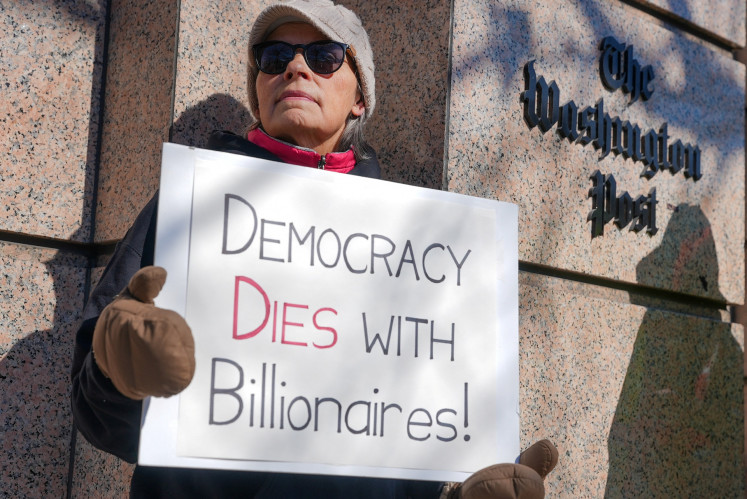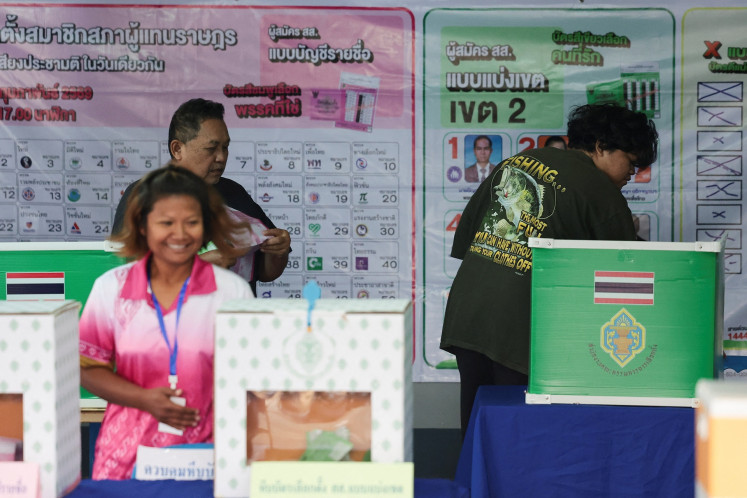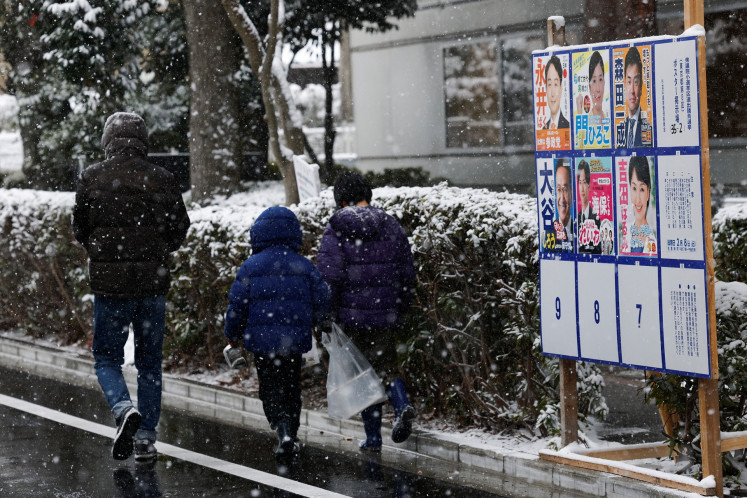Popular Reads
Top Results
Can't find what you're looking for?
View all search resultsPopular Reads
Top Results
Can't find what you're looking for?
View all search resultsLeaders meet for Amazon summit amid worries over global cooperation
Change text size
Gift Premium Articles
to Anyone
 Oxfam activists wearing oversized masks representing (from left to right) European Commission President Ursula Von der Leyen, South Africa's President Cyril Ramaphosa, Argentina's President Javier Milei, US President Donald Trump and Canada's Prime Minister Mark Carney pose during their “Big Heads“ protest stunt at the riverbank of the Federal University of Para in Belem, Brazil, on November 5, 2025 on the sidelines of the COP30 UN Climate Summit. (AFP/Mauro Pimentel)
Oxfam activists wearing oversized masks representing (from left to right) European Commission President Ursula Von der Leyen, South Africa's President Cyril Ramaphosa, Argentina's President Javier Milei, US President Donald Trump and Canada's Prime Minister Mark Carney pose during their “Big Heads“ protest stunt at the riverbank of the Federal University of Para in Belem, Brazil, on November 5, 2025 on the sidelines of the COP30 UN Climate Summit. (AFP/Mauro Pimentel)
D
ozens of country leaders will gather on Thursday in Brazil’s Amazon city of Belem ahead of the annual UN summit on climate change, hoping to advance progress despite growing concerns that multilateral cooperation is on the brink.
The COP30 conference marks three decades since global climate negotiations began. In that time, countries have curbed the projected climb in emissions somewhat – but not enough to prevent what scientists consider extreme global warming in the next few decades.
Over two days, Brazil’s COP30 presidency has lined up 53 heads of state to deliver speeches, along with more than 40 subnational leaders. UN Secretary-General Antonio Guterres is expected to be among them.
Missing from the lineup are the leaders of four of the world’s five most-polluting economies – China, the United States, India and Russia – with only the leader of the European Union showing up.
But unlike the others, the climate-denying US administration has opted to send no one to the talks.
Some said the absence of the US may free countries to discuss action without any one player dominating the outcome.
“Without the US present, we can actually see a real multilateral conversation happening,” said Pedro Abramovay, vice president of programs at Open Society Foundations and a former justice minister under President Luiz Inacio Lula da Silva.
He noted that Lula in general had been engaging with leaders outside of Latin America in China, Africa, Southeast Asia and Europe on the topic.
On Thursday, Lula planned to hold bilateral meetings with UK Prime Minister Keir Starmer and French President Emmanuel Macron, after meeting one-on-one on Wednesday with the Chinese vice premier and leaders from Finland and the European Union.
“In a moment in which a lot of people are kind of claiming the death of multilateralism, I think there is a new space for multilateralism that is not built in a top-down way from powerful countries towards poor countries,” Abramovay told Reuters.
Methane emissions goal gets monitoring boost
Brazil has urged countries to ditch the idea of making new promises, and instead fulfill the hundreds of pledges already made toward efforts to rein in planet-warming emissions and finance life-saving solutions to extreme weather and other dangerous impacts of a warming world.
One of those measures – a COP26 deal to reduce global methane emissions by at least 30 percent from 2020 levels by 2030 – is far off track.
While scientists have urged countries to halt emissions of the potent greenhouse gas as a first step in tackling warming, methane emissions have risen since the 2021 pledge was made at the UN summit in Glasgow.
On Thursday, former New York City Mayor and billionaire Michael Bloomberg announced a US$100 million investment to boost collection of methane monitoring data from a global network of satellites.
The investment will also support policy efforts by nine countries including Australia, Indonesia, Mexico and Nigeria as well as US states like California and New Mexico to curb methane leaks.
“Ten years on from the Paris Agreement, we now have the technology and the international momentum to act quickly and effectively against coal and methane - the decisive front in the battle against climate change," said Macron, who supports the initiative.
Hopes wealthy countries will invest
The World Leaders Summit could seal the fate for Brazil’s showcase proposal – the Tropical Forest Forever Facility, a multilateral funding mechanism to support conservation of endangered forests and the people who live in them.
Brazil has asked countries to offer investment to the fund. But the United Kingdom, which helped to frame the way the fund works, delivered an early disappointment on Wednesday, disclosing that it would be offering no cash.
Brazil offered the first investment of $1 billion in September, and last week Indonesia pledged to match that, Lula said. China also said it would be contributing, but hasn’t yet said how much.
None of the wealthy, industrialized countries have yet announced contributions, which Lula hopes will change on Thursday.









